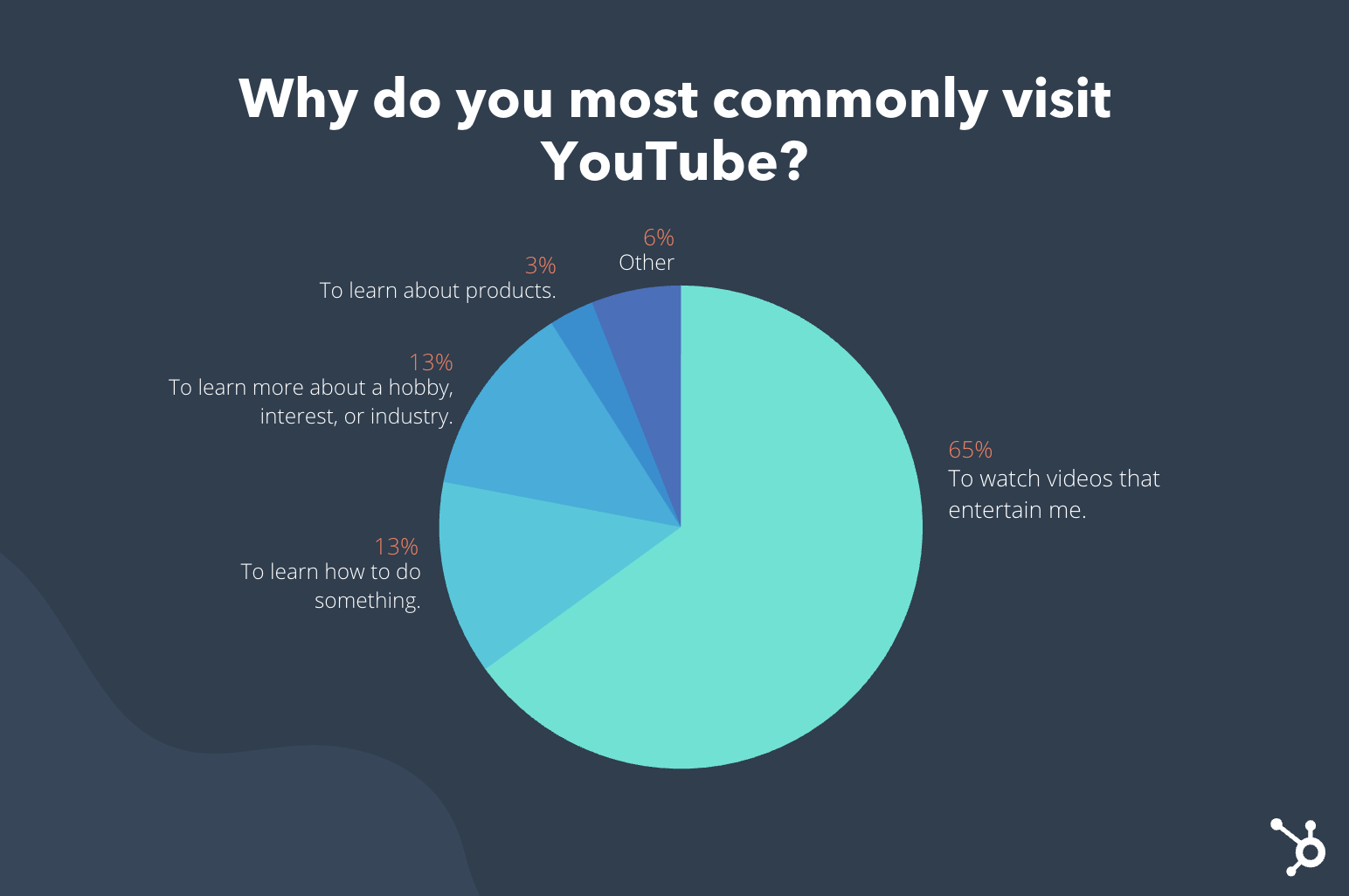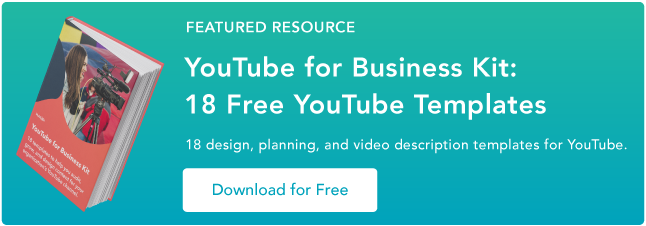YouTube is the second largest website globally with over 2 billion global users.
Still, despite its huge audience, it can be challenging to gain engagement on your videos.
Ultimately, to gain views, likes, shares, and even subscribers, your content will have to engage at least part of YouTube’s huge audience while fulfilling their needs.
But, if you’re just starting on YouTube, or struggling to grow your strategy, you might not know what the platform’s audience wants just yet.
To help marketers learn more about YouTube’s huge user pool, and their interests, I asked nearly 300 consumers: “Why do you most commonly visit YouTube?”
Here’s what they said.
Why Do People Visit YouTube?
Before we dive into what people picked as the most common reason they visit YouTube, it’s worth mention one thing you won’t see on the list below: product discovery.
Just a measly 3% of respondents visit YouTube primarily to “learn about products.”

However, you shouldn’t panic just yet. Keep in mind that we just polled a small group of general consumers about their most common reason for visiting YouTube. Had we asked them for their top three reasons, polled a larger group, or polled a specific demographic, the results could have been different.
It’s also worth noting that many demographics search out product videos when they’re researching a prospective purchase.
In fact, in a 2020 recent survey, 94% of people said they watch explainer videos to learn about products. While many YouTube users might not go to the YouTube platform just for product videos all the time, they probably still watch them when they’re relevant to their buyer’s journey.
However, knowing what YouTube audiences are looking for on YouTube will help you make a video related to your brand or product that still mixes in elements that can engage them and fulfill their viewing needs.
So, why do people visit YouTube? Let’s dive into the three most popular motives.
1. To watch videos that entertain me.
When we asked consumers why they visited the world’s second-largest platform, a whopping 65% of them said they did so for pure entertainment.
This stat might be terrifying for marketers, especially if you sell a product that might not be considered super flashy or attention-grabbing.
But, the stat above shouldn’t have you panicking just yet. Keep in mind that this is just one small survey. Had we asked people of certain age groups or industries this specific question, the results could have swayed in another direction.
However, it is very important to keep in mind that people on YouTube want to be entertained or at least intrigued by the content they’re watching. So, whether you’re planning to launch YouTube video ads or standard videos, you’ll want to add a touch of entertainment, action, or interesting information to them.
Here’s a great video, created by Headspace and LOL Network, that features actor Kevin Hart struggling to meditate and using the Headspace app to help him relax while jogging.
Even if you can’t work with a big-name celebrity, this video is still a great example of content that tells an entertaining story about how a product solves common problems. While Hart’s fame might pull people in, watching him worry about relatable, everyday things as he jogs could be relatable and funny to audiences.
2. To learn how to do something.
We’ve all had a moment in life where we couldn’t figure out how to do something and scoured the internet for a video that could help. That’s why it’s not surprising that 13% of respondents primarily visit YouTube to “learn how to do something.”
As a marketer, you can leverage the YouTube audience’s need for advice and guidance with videos on how to do things related to your brand, industry, or even your product.
On top of zoning in on the how-to format, you could also mix in entertaining elements, such as an influencer or entertaining video host, to fulfill a viewer’s need for interesting content
Here’s an example of a how-to video from B Simone Beauty, a cosmetics brand named after its founder B Simone. In the video, Simone, also known for her work as a stand-up comedian, offers a step-by-step tutorial on how to give yourself a glamorous makeover.
While the video highlights B Simone Beauty products, it focuses on makeup tutorial tips. Not only does this help audience members who have purchased cosmetics from the brand, but it also gives prospects helpful tips. By watching this video, you not only see what using B Simone products is like in real life, but you also learn how knowledgeable Simone is about makeup. Both of these elements could enable viewers to trust the company and product quality.
3. To learn about something, such as a hobby, interest, or industry.
While some people use YouTube to find step-by-step guides on how to do something, some just watch videos to soak up as much valuable information as possible. In our poll, 13% of respondents said they visit YouTube to “Learn about something related to a hobby, interest, or industry.”
As a marketer, you can also leverage this YouTube user need in your videos or in-stream ads. Here are just a few ways to weave valuable information into your next video.
- Leading the video with a surprising or interesting stat.
- Featuring expert tips or insight-filled interviews from your company leaders or industry experts.
- Recording an explainer video with fun graphics, charts, and interesting information about a topic related to your industry or brand.
Here’s an example of a video HubSpot posted that discusses how TikTok’s audience has begun to mature by discussing stats and facts about the platform.
Although HubSpot isn’t a TikTok tool, it has a large marketing audience that the company is engaging with this video that educates viewers on a highly trendy topic.
By creating informative or educational videos related to your industry, you enable the viewers with similar interests to learn something new while also developing trust for your company. So, even if you aren’t explicitly mentioning your product, viewers could remember your brand and your expertise next time they’re shopping in your immediate space. Similarly, if someone does do product research and comes across your YouTube channel, they might trust that a brand with solid knowledge around an industry will create high-quality products.
Other Answers
Aside from the top three responses, 3% of people said they go to YouTube primarily to watch videos of their “favorite celebrities or influencers” while another 3% primarily use the platform to find videos related to “news and trends.”
While these responses don’t need to inform your strategy, they align well with the themes that people are looking for entertainment and interesting information.
Catering to YouTube’s Giant Audience
Ultimately, it’s unlikely that every single YouTube viewer will love your content or search out the types of videos you make. However, since the audience is so broad, there’s at least a large segment of it that could engage with your marketing strategy. As you develop or fine-tune your tactics, keep these tips in mind:
- Know your audience: Learn the ins and outs of who uses the platform, identify the best demographics or targets to go after, and look at what types of videos they engage with most.
- Mix education with entertainment: While many people visit the platform for entertainment or escape from their daily lives, others crave valuable or helpful information. So, try to create content that intrigues viewers, while also giving valuable information related to your brand or industry.
- Don’t limit yourself to product videos: While you can certainly post a few demos, interesting customer stories, and mention your product in a few videos, keep in mind that YouTube visitors might not be looking for commercial-like content. Try to add variation with explainers, expert interviews, or other interesting, but on-brand, video formats.
Need more help with developing or expanding your YouTube strategy? We’ve got you covered.
Check out this data on why people click out of YouTube videos, this Ultimate Guide to YouTube Marketing, or download the free resource below.
![]()

![→ Free Templates: How to Use YouTube for Business [Download Now]](https://i4lead.com/wp-content/uploads/2021/06/b33cfd44-133a-49e3-a943-086c5679d485-1.png)
